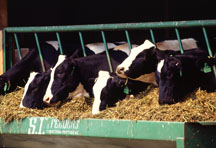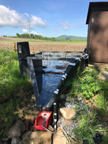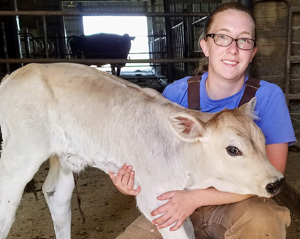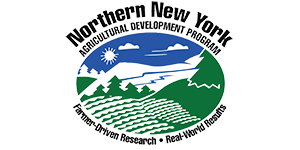
Chazy, N.Y.; November 25, 2019. Water quality, winter calf care, and heat stress abatement projects funded by the Northern New York Agricultural Development Program are on the December 11, 2019 Dairy Day program at Miner Institute in Chazy, N.Y. The presentations will share results and updates on water quality science field trials, dairy cow heat stress abatement research, and winter calf feeding trials made possible with grants from the farmer-driven NNYADP.
This Dairy Day event is free and open to the public; lunch will be available for $5/person. Pre-registration is appreciated; contact Wanda Emerich at 518-846-7121 x117, emerich@whminer.com.

Miner Institute Nutrient Management Researcher Laura Klaiber will present an update on the unprecedented water quality research related to agricultural production being conducted in the Lake Champlain region of New York State.
Klaiber notes, “Until the Northern New York Agricultural Development Program established these research trials there had been very few in-depth year-round studies in the Lake Champlain basin designed to investigate how the use of tile drainage impacts nutrient balances in agricultural fields.”
The data generated by the real-world field testing at Miner Institute, on regional farms, and at a long-term data collection established for the NNYADP project at the New York State Department of Environmental Conservation Lake Alice Wildlife Area in Chazy, N.Y., will serve as a science-based foundation to drive water quality conservation for New York State and beyond.
USDA Agricultural Research Service Soil Scientist Eric Young, Marshfield, WI, comments, “The Northern New York Agricultural Development Program-funded projects provide critical runoff monitoring within dairy systems and generate important results with broad interests from farmers, regulators, manager,s legislators, and scientists in New York, New England, and Canada.”
At the December 11 Dairy Day event, Klaiber will specifically speak on edge-of-field studies that are developing data critical for guiding environmentally-focus farm management metrics.
“As we all know, weather events can be highly variable and extreme, so multi-year data collection that increases our knowledge base is the foundation for developing the best management recommendations to positively impact nutrient use, farm economics, and environmental stewardship,” Klaiber says.
The American Society of Agronomy, Crop Science Society of America, Franklin Watershed Committee, Green Mountain Dairy Discussion Group, Lake Champlain Basin Program, and others throughout the eastern U.S. have requested the results of this NNYADP-funded water quality research.

Heat Stress Abatement and Winter Season Calf Care Research for NY Dairy Farmers
The Dairy Day program also includes Miner Institute Director of Research Katie Ballard presenting Beat the Heat: Are North Country Cows Susceptible to Heat Stress?, a research update on studies with the cows in the Miner Institute dairy herd and on farms in Northern New York, evaluating how warm weather climate extremes impact dairy cow comfort and milk production.
“This research has shown us dairy cows are adversely impacted by episodic bouts of heat stress, even during a summer without any true heat waves. We are evaluating various heat abatement measures that farmers can match to their individual farm facilities to help increase cow comfort and maintain milk production during periods of heat stress,” says Ballard, who began building this climate-adaptability knowledge base for dairy producers with a Northern New York Agricultural Development Program grant in 2015.
At the December 11 Dairy Day, Miner Institute Research Scientist Sarah Morrison will share details from a project funded by the NNYADP in 2019 to investigate ways to enhance dairy calf well-being during the winter season. She is especially looking at how dietary nutrient management for calves influences their health and growth in various housing systems.
“This research is providing insights to help farmers target their nutrient programs for calves in different housing systems. The information from this study is highlighting strengths and opportunities for managing calves through the coldest months of the year. By focusing on both nutrient and management, calves will have the greatest opportunity for optimal growth and health,” Morrison notes.

Funding for the Northern New York Agricultural Development Program is supported by the New York State Legislature and administered by the New York State Department of Agriculture and Markets. Learn more at www.nnyagdev.org.